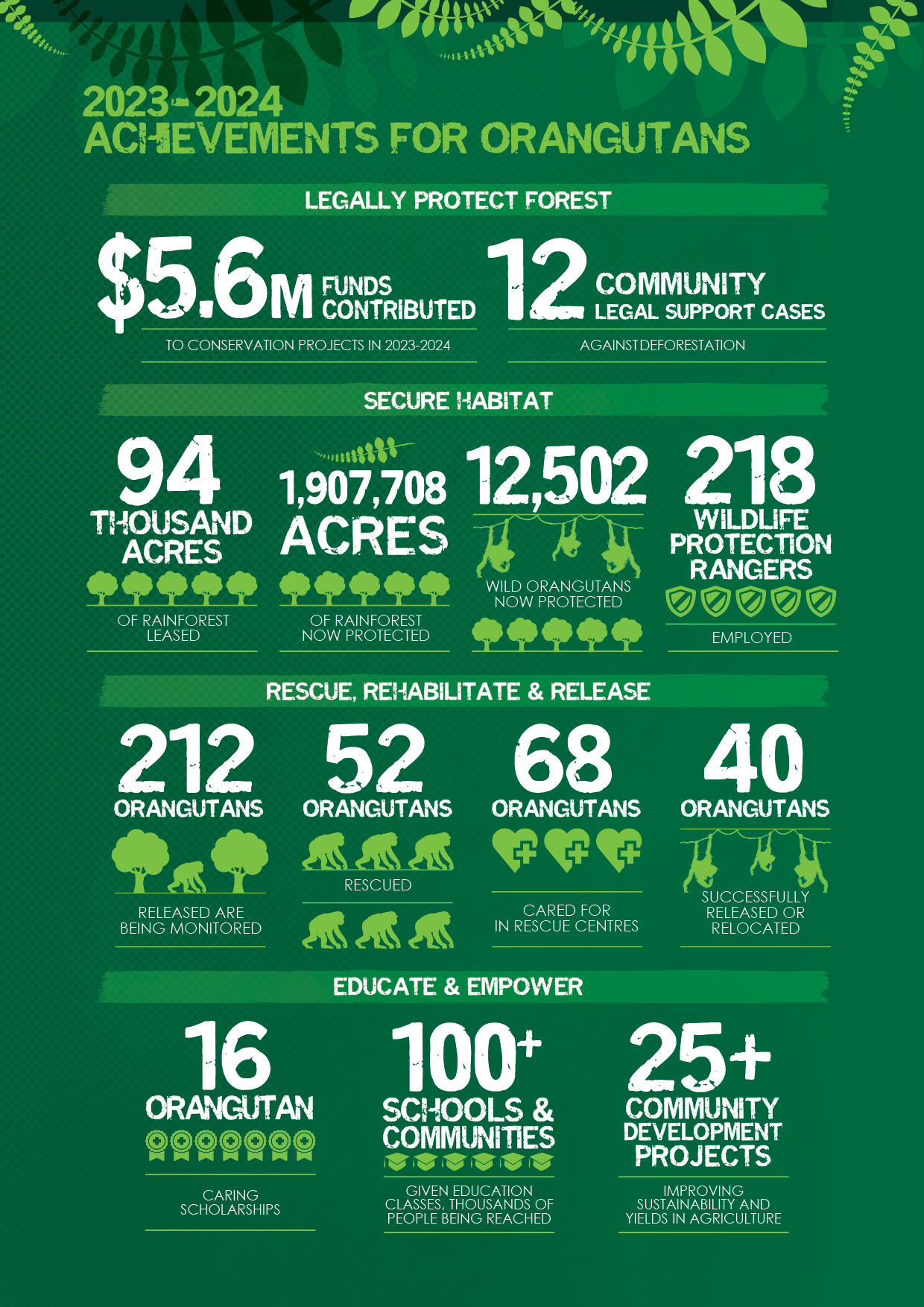The Orangutan Project was established in 1998 by founder and world-renowned orangutan expert, Leif Cocks, as a result of his 35+ year career working with orangutans - including establishing the most successful breeding colony of orangutans in the world. The Orangutan Project was formed with a key mission; to ensure that Critical Endangered wild orangutan species would be protected against extinction, and would continue to live in secure populations for generations to come.
Today, The Orangutan Project is a dynamic, fast-growing and successful not-for-profit project that supports a wide range of critical projects that address the holistic problem facing remaining fragmented orangutan populations - including fighting deforestation and habitat loss at the highest level.
The projects funded by The Orangutan Project not only include direct orangutan conservation, such as orangutan rescue, rehabilitation and release programs, but also forest habitat protection and regeneration, education, research and local community partnerships. Tying funding into direct outcomes for the species has enabled The Orangutan Project to partner with the majority of orangutan conservation projects operating on the ground today in Borneo and Sumatra.
This has greatly increased overall efficiency and transparency in saving the species as a whole, bringing together the key players and groups who are working tirelessly on the ground to ensure the species’ survival.
The long-term growth and sustainability of The Orangutan Project has been made possible only by the loyal support of our individual donors, many of whom have supported the organisation each year since inception.
Through orangutan ‘adoptions’, Save Forest, regular donations and critical appeals, the organisation has been able to achieve more for the species than any other orangutan conservation group. The ongoing support from our individual donors is imperative for the organisation to reach our goal of increasing the number of wild orangutans under The Orangutan Project’s permanent protection to 8,000, to ensure sufficient numbers of each orangutan species/subspecies survive indefinitely.
All orangutans will live in their natural habitat in secure and viable populations.
To ensure the survival of all orangutan species in their natural habitat and promote the welfare of all orangutans.
Since its formation in 1998, The Orangutan Project has contributed more than USD$20 million directly into orangutan conservation projects and has earned a reputation amongst its partners and donors for being financially responsible and transparent.
We are committed to making sure your donations work as hard as possible. We don’t have an office - each member of our team works from their own home, using their own electricity, internet and infrastructure. This helps keep our overheads amongst the very lowest in the sector, and ensures as much of your donation as possible goes straight to where it’s needed most.
We are also working hard to increase and secure our future income streams. Our big goal is to raise USD$13 million dollars every year because we know that’s the only way we can secure the long term survival of all orangutan sub-species, and safeguard their jungle habitat. And we will achieve this, with your help!
Summary of Achievements

The Orangutan Project is a registered business name owned by Wildlife Conservation International. In order to bring the other species which have fallen outside of the umbrella of the holistic conservation strategy, namely, elephants, tigers and indigenous communities, three additional projects were added to our portfolio, the International Elephant Project, International Tiger Project and Forests for People. This ensures our project remains holistic and benefits all living beings in the ecosystems we’re working within, as well as provide an opportunity for donors to focus their impact on areas that are important to them.
In Canada, Wildlife Conservation International is represented by WCI Canada Foundation.
For more information about our achievements, fundraising and distributions of funds visit our latest Impact Report. See previous years’ reports here.
Wildlife Conservation International commissions an independent accounting firm to audit our organisation each year, SW Audit. The audit information is submitted to the Australian Charities and Not-for-profits Commission (ACNC) and other regional authorities where required. See previous years’ reports here.
2023-2024 Audited Financial Statement (Wildlife Conservation International Limited)
2023-2024 Audited Financial Statement (Australian Orangutan Project)
A Form 990 is a public tax return that U.S. nonprofits file with the IRS each year to report their finances, governance, and activities. It's like a financial report card that shows how the charity operates and spends its money. See previous years’ reports here.
2024 F990 (Wildlife Conservation International)
As a registered ANBI (Public Benefit Organization) in the Netherlands, we publish annual ANBI reports outlining our mission, activities, governance, and financials to ensure transparency and compliance with Dutch tax regulations.. See previous years’ reports here.
2024 ANBI Publicatie Formulier (Dutch)
2024 ANBI Publicatie Formulier (English)
Wildlife Conservation International is committed to social equity within all of our conservation projects and programs, and within our organisation. This is consistent with the essential characteristics of our organisation’s mission and concern for social justice and equity.
Wildlife Conservation International will at all times endeavour to:
Wildlife Conservation International will not discriminate based on a person’s: race, colour, national or ethnic origin, nationality, religion, sex or gender identity, sexual orientation, marital status, pregnancy, intellectual or physical impairment and disability.
Wildlife Conservation International complies with all relevant legislation in its pursuit of equal employment opportunities.